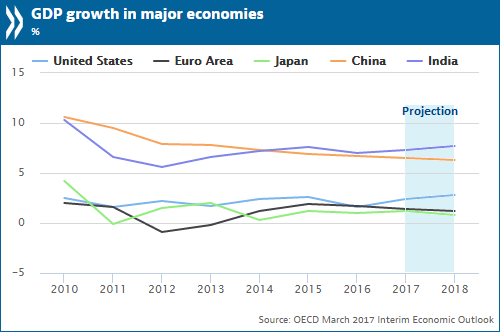Modest pick-up in global growth but risks and vulnerabilities could derail recovery
Global economic growth is expected to pick up modestly next year to around 3.6 % from a projected 3.3% in 2017 but risks of rising protectionism, financial vulnerabilities, potential volatility from divergent interest rate paths and disconnects between market valuations and real activity hang over the outlook, according to the OECD.

The projected improvement largely reflects continuing and expected combined fiscal and structural initiatives in the major economies - notably China, Canada and the United States - together with a slightly more expansionary stance in the euro area, which could be more ambitious. Such policies are needed to catalyse private demand to boost global activity and reduce inequalities.
The global economy portrayed by the Interim Economic Outlook remains beset by sub-par GDP growth and high inequality, calling for policy responses that advance inclusive growth in the context of increased economic integration.
Commenting on the Outlook, OECD Secretary-General Angel Gurría said: “Growth is still too weak and its benefits too narrowly focussed to make a real difference to those who have been hit hard by the crisis and who are being left behind. Now, more than ever, governments need to take actions that restore people’s confidence while at the same time resisting turning inwards or rolling back many of the advances that have been achieved through greater international co-operation.”
The OECD’s Interim Economic Outlook examines some of the many risks that could derail the projected modest upturn in global growth.
Foremost among these there is the risk of rising protectionism that would hurt global growth and impact the large number of jobs that depends on trade. The rapid growth of private sector credit and the relatively high level of indebtedness is a key risk in a number of emerging markets, above all in China, and housing valuations are a matter of concern in some advanced economies.
The strength of financial market valuations appears disconnected to the outlook for the real economy, where the growth of consumption and investment remains subdued. There is also a risk of global financial market tensions as interest rates adjust and diverge across the major economies. The social cost of the crisis and the increased inequalities need to be addressed to make growth more inclusive and to reduce pressures for protectionism and other populist responses.
OECD Chief Economist Catherine L. Mann said: “The pick-up in growth from countries taking fiscal initiatives is broadly welcome, but we cannot ignore the danger that the recovery gets knocked off track by policy errors or financial risks and vulnerabilities. Coherent and committed policy action is needed to simultaneously raise growth rates and improve inclusiveness.”
In the United States, domestic demand is set to strengthen, helped by gains in household wealth and a gradual upturn in oil production. GDP growth is expected to pick up to 2.4% this year and 2.8% in 2018, supported by an anticipated fiscal expansion, despite higher long-term interest rates and a stronger dollar.
The moderate pace of growth is expected to continue in the euro area but is being held back in some countries by stubbornly high unemployment and underemployment – particularly of youth – as well as by banking sector weakness. GDP for the area as a whole is expected to expand at an annual rate of 1.6% in both 2017 and 2018.
In Japan, fiscal easing and improvements to women’s labour force participation will help GDP growth pick up this year to 1.2% from 1.0% in 2016. Prospects will depend on the extent to which labour-market duality is reduced and wage growth picks up.
Growth in China is projected to slip further to 6.5% this year and to 6.3% in 2018 as the economy makes a necessary transition away from a reliance on external demand and heavy industry toward domestic consumption and services.
Higher commodity prices and easing inflation are supporting a recovery from deep recessions in Brazil and Russia.
The OECD says governments need to manage risks, enhance economic resilience and strengthen the environment to boost growth, with improvements in both productivity and inclusiveness. Focussing on policies that build structural elements into fiscal initiatives would reduce the burden on monetary policy in the advanced economies and help to boost trade, investment, productivity and wages.
Source: Organization for Economic Co-operation and Development
- 246 reads
Human Rights
Ringing FOWPAL’s Peace Bell for the World:Nobel Peace Prize Laureates’ Visions and Actions

Protecting the World’s Cultural Diversity for a Sustainable Future

The Peace Bell Resonates at the 27th Eurasian Economic Summit

Declaration of World Day of the Power of Hope Endorsed by People in 158 Nations

Puppet Show I International Friendship Day 2020

